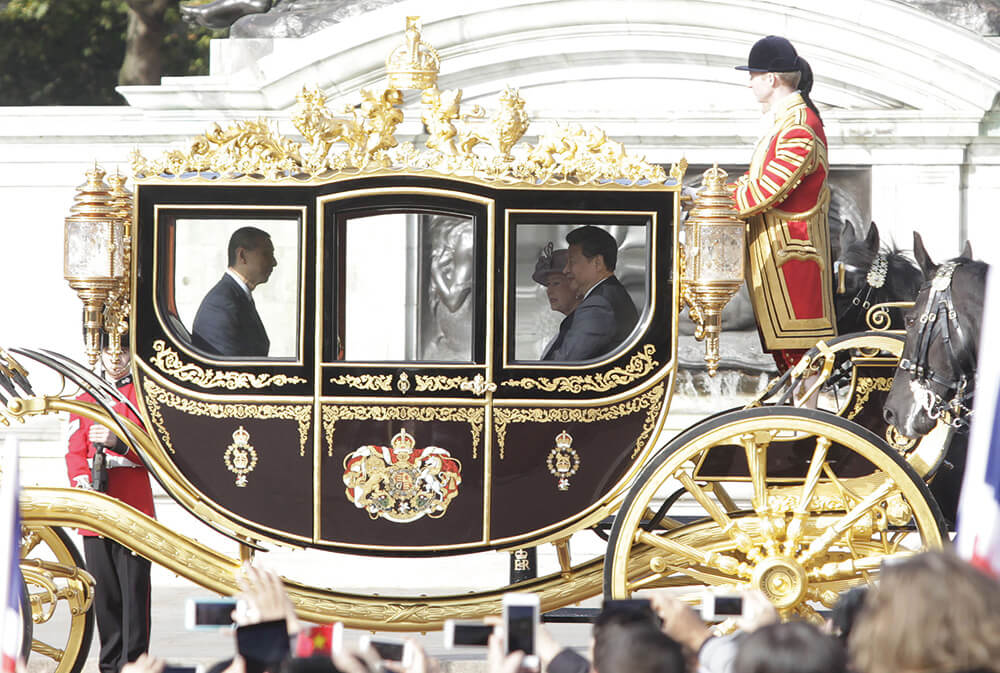Over the centuries, trade deals between the UK and China have ebbed and flowed with success and unwitting insult. Some meetings have been resolved with democracy, others sorted out over a pint. Business Vision’s TONY LENNOX examines why one little bit of history keeps repeating
AMERICAN president Donald Trump has been heaping on the praise for Communist Party Leader Xi Jinping since recent confirmation of the Chinese politician’s second term of office.
Trump has picked Beijing as critical to resolving the North Korean nuclear crisis, and there has been something of a PR bromance between the two leaders, both of whom are set on restoring their nations to greatness.

Britain’s relationship with China, and President Xi, has been shaded with rather more controversy. As the red carpet was rolled out for Chinese president Xi Jinping on a recent state visit to the UK, critics at home and abroad accused Britain of “kowtowing” to the eastern superpower.
It was not the first time the word had been used in reference to China. Members of a British trade delegation to Beijing in the late 1700s refused to kowtow when they were brought into the presence of the emperor. This apparent insult to the majesty of “the son of heaven” was initially forgiven by the Chinese who reasonably assumed that the barbarians’ socks were too tight to allow them to kneel.
When later deputations of diplomats and traders continued this impertinence, China, to whom ritual was the cornerstone of civilisation, began to regard the British with suspicion. The reputation thus earned by these “insolent and crafty savages” took root – and has never really disappeared.
The word “kowtow” actually came into the language via British interaction with China. Back in the 18th century China was an advanced society, comfortable in its supreme position in its sphere. It had little knowledge or experience of the west. Britons who traded along its southern shores were just some of a number of strange and uncultured brutes who exchanged interesting trinkets for tea, porcelain and silks.
The Cantonese word for those coarse English traders was Ying-ji-li; today the word is commonly used in China in reference to a popular brand of razor – an indication, perhaps, of the type of trade that was being carried on between the two countries at the time.
But that relationship was to change – in a ruthless manner. For Chinese historians, the modern era is generally accepted to have begun in 1820 with an Anglo-Chinese conflict – the first Opium War. The effect of this encounter still has resonance in China today. British imperial arrogance in its treatment of the Chinese may have been almost forgotten in the UK, but those old wounds still sting in China.
While British Prime Minister Theresa May has spoken of rekindling of a “golden era” of trade between the UK and China, Chinese schoolchildren are still following a Maoist curriculum which teaches that the first golden era was a one-sided affair which resulted in much shameful kowtowing to western imperialists.
This historical perspective still colours China’s attitude to Britain. It is alleged that on the eve of his visit to Britain in 2014, the Chinese Premier Li Keqiang insisted that if his hosts couldn’t engineer a meeting with the Queen, the trip was off. At around the same time, a popular Chinese tabloid savagely mocked the decline of the UK in comparison with the economic might of modern China. Referring to bygone wrongs which still resonate with the Chinese, the newspaper said: “Britain is no longer any kind of ‘big country’ but merely a country of old Europe suitable only for tourism and overseas students, with a few decent football teams.”
President Xi Jinping is known to have a keen interest in football, and would like to see China contesting for the top honours on the world stage. And Chinese money is flowing into the domestic game in the UK. Some of England’s football league clubs are now in Chinese ownership, the latest being one of the famous founders of the Football League – Wolverhampton Wanderers. The rescue of old football clubs is one activity at least where deep-rooted grievances can perhaps be overlooked.
But British diplomats have sometimes found themselves engaged in damage limitation, smoothing over perceived slights and insults which threaten to derail greater trade between the two countries. Relations have become very frosty over the issue of the Dalai Lama.
Tensions over China’s activity in Tibet, together with alleged human rights violations in Chinese society, regularly bring condemnation from bodies like Amnesty International and Human Rights Watch. These concerns have been ramped up as post-Brexit Britain looks to China for greater trade. The UK should not be kowtowing to one of the world’s most authoritarian regimes, they say.

Nevertheless, British firms are queueing for a slice of the trade, worth an estimated $62 billion, which was lined up following Mr Xi Jinping’s state visit to London last year. David Cameron famously sealed the deal by giving the Chinese leader a taste of 21st century British culture – a fish supper and a pint of bitter, perhaps an attempt to prove that the British Empire is dead and buried.
Despite the protests of human rights groups, May has been pushing ahead with attempts to persuade the Chinese to invest in various infrastructure projects, many of them in the north of England. Meanwhile, newly rich Chinese individuals are spending heavily on property in the UK, particularly in London and the south-east.
Part of the attraction for the Chinese is London’s global status as a financial centre. Earlier this year China used London to issue its first ever offshore sovereign bond. The City recently ousted Singapore as the world’s largest offshore clearing centre outside China for Chinese currency.
The hangover from the Brexit vote puts greater pressure on British firms to find new, stable friends abroad. Many are pinning their hopes on renewed trade with the east. And while Mrs May’s open-door policy is persuading the Chinese to increase their investment in domestic spheres like technology and the provision of power, many question the wisdom of giving the world’s largest Communist state unchallenged access to such nationally sensitive areas.
On the eve of the first Opium War, the Chinese emperor was encouraged by his counsellors to believe that Britain would fall into poverty if it was deprived of Chinese tea, then a major item of trade. The idea grew that without China’s “tea and rhubarb” the British, whose fondness for milk and cheese was well-known, would soon find their intestines blocked and would be incapable of waging war.
But while most of Britain’s tea comes, these days, from Africa, kowtowing to the Chinese may still run the risk of causing some serious stomach aches.




























